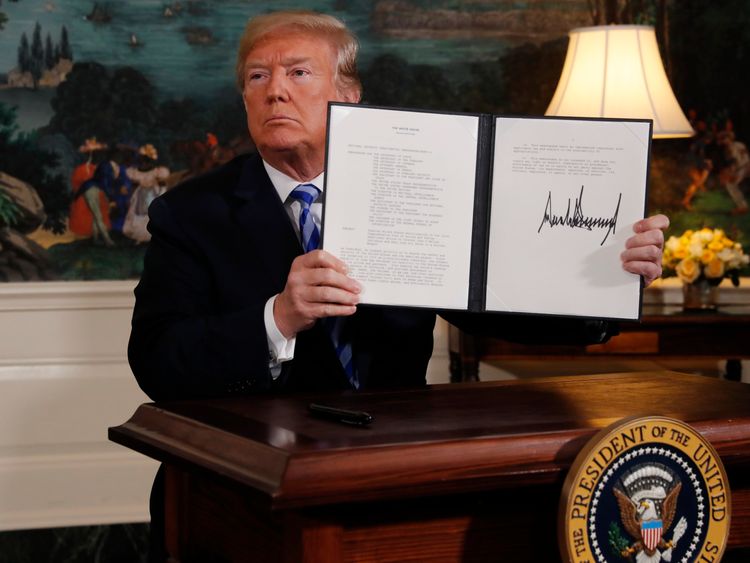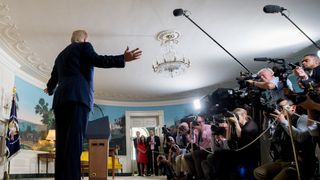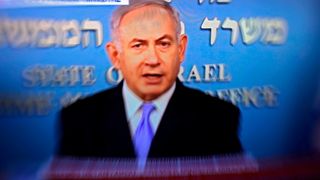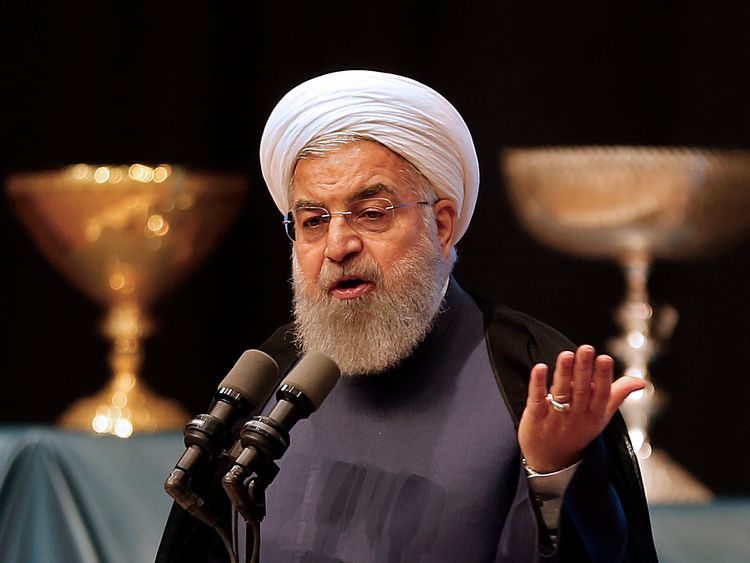Donald Trump has pulled the US out of the Iran nuclear deal to the dismay of European allies and Barack Obama, the former president who spearheaded the 2015 agreement.
During a White House announcement on Tuesday, Mr Trump once again criticised the Joint Comprehensive Plan of Action (JCPOA) and called it "disastrous" and "one-sided".
The agreement was made by Iran and the US, the UK, Russia, France, China, Germany and the EU to ensure Iran's nuclear programme was "exclusively peaceful".
After it was implemented, the US agreed to lift nuclear-related sanctions on Iran.
But since then, Mr Trump has repeatedly threatened to leave the agreement, which he claims does not address Iran's ballistic missile programme or its roles in Middle Eastern conflicts.
:: Analysis – Trump sends earthquake through the Middle East
The President said no action taken by Iran had been more dangerous than its pursuit of nuclear weapons, and claimed the deal had allowed Iran to enrich uranium and "cause havoc within the Middle East and beyond".
Mr Trump added that the accord – which he described as "an embarrassment" to him "as a citizen" – allowed a nuclear arms race to develop in the Middle East.
He then said pre-existing US sanctions on Iran would be reinstated, telling reporters: "Powerful sanctions will go into full effect.
"If the regime continues its nuclear aspirations, it will have bigger problems than it has ever had before."
:: US pulls out of Iran deal – What happens next?

The Iran deal has been viewed as the key foreign policy achievement of Barack Obama's administration. The former leader swiftly condemned the move.
"I believe that the decision to put the JCPOA at risk without any Iranian violation of the deal is a serious mistake," he said in a statement.
"Without the JCPOA, the United States could eventually be left with a losing choice between a nuclear-armed Iran or another war in the Middle East.
"We all know the dangers of Iran obtaining a nuclear weapon. It could embolden an already dangerous regime; threaten our friends with destruction; pose unacceptable dangers to America's own security; and trigger an arms race in the world's most dangerous region."
 2:42
2:42Prime Minister Theresa May, in a joint statement with France's Emmanuel Macron and German Chancellor Angela Merkel, expressed her "regret and concern" and urged "all sides to remain committed" to the deal.
"Together, we emphasise our continuing commitment to the JCPOA," their statement read. "This agreement remains important for our shared security."
Russia's deputy UN ambassador Dmitry Polyanskiy said Moscow was "disappointed" but "not surprised" by the move.
Despite the opposition, Israeli Prime Minister Benjamin Netanyahu praised the "brave and correct" decision by Mr Trump, before saying the 2015 accord was a "recipe for disaster".
 1:55
1:55Naftali Bennett, Israel's education minister, told Sky News Mr Trump's move was "very good news for the free world".
He said: "This was a bold and courageous decision of President Trump that's going to make the world much safer because effectively it's going to put a stop to the nuclear arms race that was beginning to develop in the Middle East – the most dangerous region in the world."
Saudi Arabia also joined Israel in welcoming Mr Trump's decision, with its foreign ministry accusing Iran of "taking advantage of the revenue generated by the lifting of the sanctions to destabilise the region".

Iranian President Hassan Rouhani said Tehran would remain in a nuclear deal without the US before taking aim at Mr Trump, saying he had "a history of undermining international treaties".
More from Donald Trump
The country's foreign minister, Javad Zarif, also hit out at the move – calling it an "unlawful withdrawal".
John Bolton, Mr Trump's national security adviser, said the US leader had signed a memo ordering agencies to reissue all nuclear sanctions on Iran waived by Mr Obama and added that it was "entirely possible" additional sanctions could follow.
[contf] [contfnew] 
Sky News
[contfnewc] [contfnewc]






